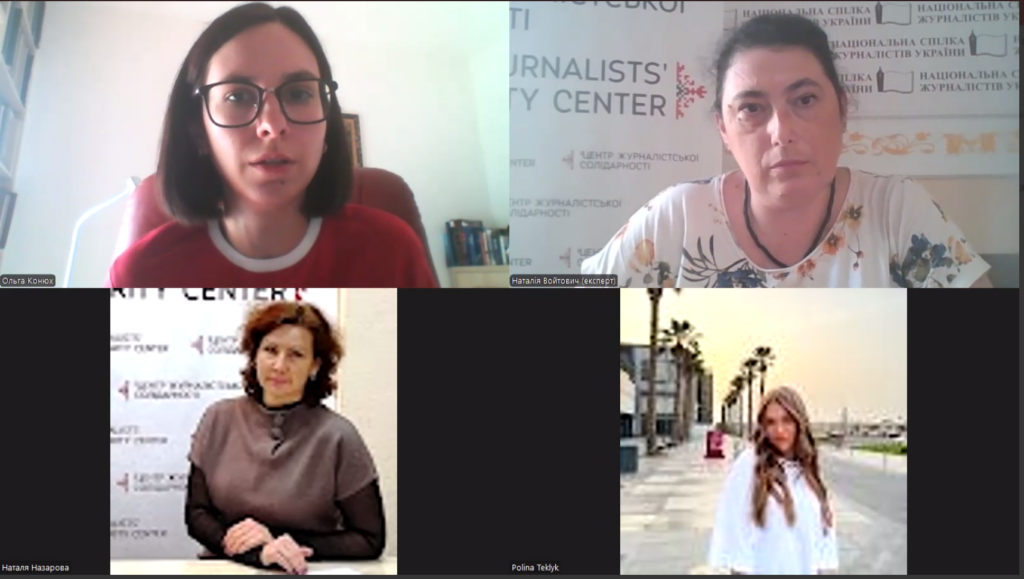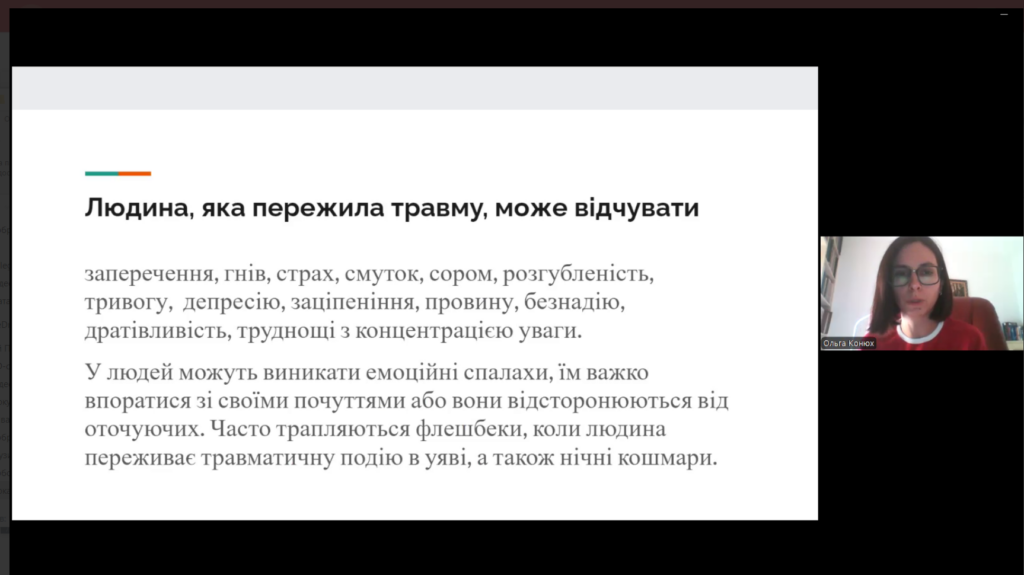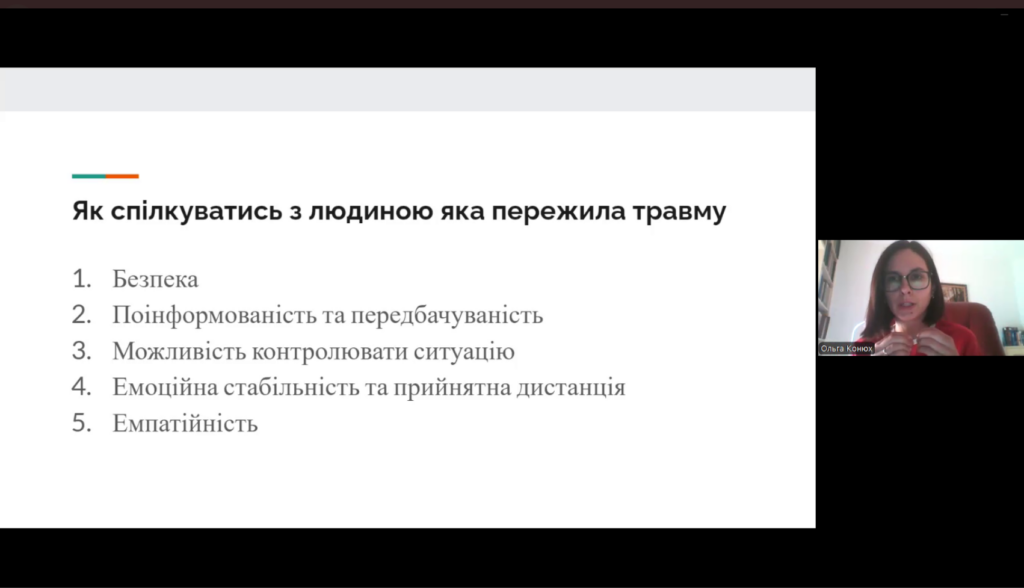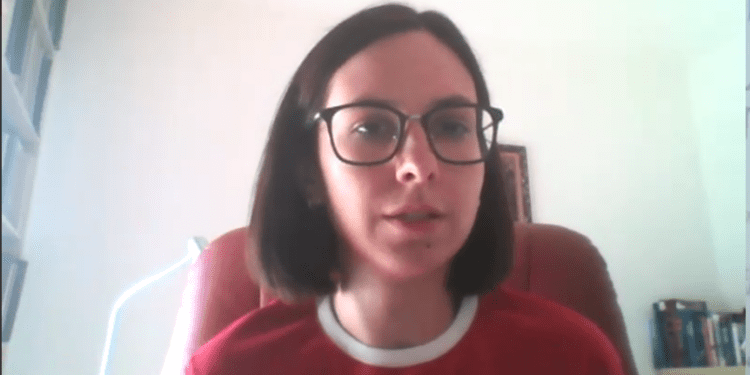The Lviv Journalists’ Solidarity Center (JSC) of the National Union of Journalists of Ukraine (NUJU) hosted an online training on How to Talk to Survivors of Psychological Trauma. The event was attended by journalists and public activists who wanted to deepen their knowledge in this area and learn how to effectively help people. After all, journalists who work in a war zone or cover the consequences of war, in particular russian shelling, often have to communicate with people who have experienced physical and psychological trauma. Such conversations are not always easy both for the survivor and the journalist himself, because the discussion is filled with personal experiences. That is why media professionals need to understand how to properly communicate with people who have experienced a traumatic experience. Understanding the psychological effects of trauma helps avoid further trauma during interviews or information gathering.
During the meeting, psychotherapist Olha Koniukh shared her knowledge and methods of working with people who have experienced traumatic events. She emphasized the importance of understanding the psychological processes that occur in victims and the need to create a safe and supportive environment for them.
“Such meetings are extremely important. After all, the topic we discussed today is very relevant. Journalists who communicate with people who have experienced traumatic events must always consider the ethical aspect and psychological state of the interlocutor in their work. I believe that such training will help journalists to improve their professional level. In addition, media workers should not forget about their psychological health, as we are all living in difficult times,” noted Nataliya Voitovych, the coordinator of the Lviv JSC.

The participants in the event were told about the types of traumatization; in particular, the concept of witness trauma was considered. Journalists working with sensitive topics should understand their own risks and prepare for the appropriate conversation. Olha Koniukh focused in more detail on those factors that can retraumatize the hero and cause negative emotions. Media workers also realized what feelings the hero may experience during the trauma or when recalling the situation.
“I am sincerely grateful for the invitation to the lecture with psychologist Olha Koniukh. I would like to note the importance of the topic of covering psychological traumas and the peculiarities of communicating with people who have experienced traumatic experiences, especially during the period of a full-scale invasion. The lecturer emphasized the importance of empathy and respect for the respondent, in particular, by explaining the basics of the psychology of traumatic situations and their causes. The lecture was informative and practically useful, because it helped to better understand how to cover the topics of psychological trauma with sensitivity and professionalism,” shared journalist Sofiya Syvanych.
The Center plans to continue a series of similar meetings and training sessions in order to provide journalists with the necessary resources for working in crisis situations and to provide an understanding of what approach to choose when preparing material on a sensitive topic.
Call the Western Ukrainian JSC Lviv-Chernivtsi at 097 907 9702 (Nataliya Voitovych, the Lviv JSC coordinator, Volodymyr Bober, an assistant). The Center’s address is 5 Solomiyi Krushelnytskoyi Street.


ABOUT JSC
The Journalists’ Solidarity Centers is an initiative of the NUJU implemented with the support of the International and European Federations of Journalists and UNESCO. The initiative is designated to help media representatives working in Ukraine during the war. The Centers operate in Kyiv, Lviv, Ivano-Frankivsk, Chernivtsi, Zaporizhzhia, and Dnipro and provide journalists with organizational, technical, legal, psychological, and other types of assistance.
ABOUT UNESCO
UNESCO is the United Nations Educational, Scientific, and Cultural Organization. It contributes to peace and security by promoting international cooperation in education, sciences, culture, communication, and information. UNESCO promotes knowledge sharing and the free flow of ideas to accelerate mutual understanding. It is the coordinator of the UN Action Plan on the Safety of Journalists and the Issue of Impunity, which aims to create a free and safe environment for journalists and media workers, thus strengthening peace, democracy, and sustainable development worldwide. UNESCO is working closely with its partner organizations in Ukraine to provide support to journalists on the ground.
The designations employed and the presentation of material throughout this digest do not imply the expression of any opinion whatsoever on the part of UNESCO concerning the legal status of any country, territory, city, or area or its authorities or concerning the delimitation of its frontiers or boundaries.
The authors are responsible for the choice and the presentation of the facts contained in this digest and for the opinions expressed therein, which are not necessarily those of UNESCO and do not commit to the organization.
Dariya Markova

 THE NATIONAL UNION OF
JOURNALISTS OF UKRAINE
THE NATIONAL UNION OF
JOURNALISTS OF UKRAINE
















Discussion about this post